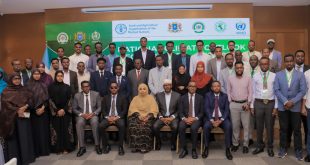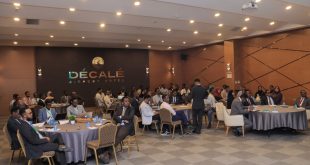MOGADISHU — In a landmark move to transform its approach to crisis management, the Somali Disaster Management Agency (SoDMA) has concluded a two-day national consultation on Wednesday and Thursday in Mogadishu, in collaboration with local and international partners.
The consultation led to the development of Somalia’s first-ever national roadmap for Anticipatory Action (AA), which aims to move beyond delayed responses and towards early, effective measures, strengthening the community’s resilience in the face of increasing risks.
A Strategic Shift to Save Lives and Mitigate Losses
Representatives from prominent regional and international organizations, including the World Food Programme (WFP), the Food and Agriculture Organization (FAO), the International Federation of Red Cross and Red Crescent Societies (IFRC), and the IGAD Mission to Somalia, participated in the consultation.
There was a consensus on the importance of this strategic shift. Mr. Alkhidir Daloum, WFP’s representative, emphasized that early action reduces humanitarian and economic costs and saves thousands of lives. The FAO representative highlighted the importance of integrating agricultural and rural solutions, while IGAD Mission Head, Mahmoud Karshe, underscored the necessity of regional cooperation to combat climate crises that know no borders.
For his part, the Chairman of SoDMA, Mahmoud Moallim Abdulle, described the roadmap as “a strategic transformation for the benefit of the Somali people,” emphasizing that growing challenges like droughts and floods require a new and effective approach.
Key Pillars and a Practical Action Plan
The first day of the consultation focused on shaping the vision and defining the four main pillars of the roadmap:
- Risk-based Early Warning: Developing robust systems for forecasting climate disasters.
- Anticipatory Financing: Creating flexible and rapid financing mechanisms to disburse funds when needed.
- Early Response: Establishing clear plans that define actions to be taken before a disaster strikes.
- Institutional Coordination and Partnerships: Enhancing cooperation among government bodies and humanitarian organizations to ensure the optimal use of resources.
The second day shifted from theoretical discussions to practical implementation, with a detailed action plan developed for each pillar. Participants proposed creating a national coordination committee for Anticipatory Action, comprising representatives from various ministries and humanitarian agencies. They also discussed sustainable financing mechanisms, including the establishment of a national fund, and outlined specific actions and responsibilities for each expected scenario, while stressing the need to integrate the roadmap with existing national policies.
The consultation concluded with a speech by the Director of SoDMA’s Disaster Risk Management, Khadar Sheikh Mohamed, who confirmed that this consultation marks the beginning of a new phase of serious and fruitful work aimed at building a more resilient Somalia in the face of crises.
 Somali Observatory for Humanitarian Affairs It is a specialized, independent, non-profit media network that observes and follows up the Somali humanitarian scene
Somali Observatory for Humanitarian Affairs It is a specialized, independent, non-profit media network that observes and follows up the Somali humanitarian scene



